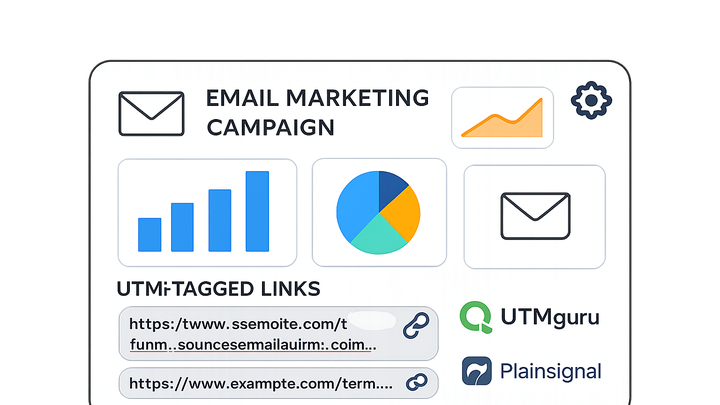Published on 2025-06-29T18:05:16Z
What is Email Marketing? Examples and Best Practices
Email Marketing in campaign tracking & analytics refers to the strategy of sending targeted email messages to a list of subscribers with the aim of nurturing leads, driving sales, and engaging with customers. It combines creative content, audience segmentation, and strategic timing to deliver personalized communications. In the context of analytics, email marketing is particularly powerful because it enables direct attribution of conversions to specific campaigns, subject lines, and audience segments. Tools like utmguru.com streamline the process of generating and managing UTM parameters for every email link, ensuring that clicks are accurately tracked in your analytics platform. Meanwhile, privacy-focused solutions such as Plainsignal offer cookie-free tracking scripts that capture visitor behavior on landing pages without compromising user privacy. By integrating email marketing with robust tracking mechanisms, marketers can gain data-driven insights that inform optimization, improve ROI, and foster stronger customer relationships.
Email marketing
Email Marketing is sending targeted messages to subscribers, tracked with UTM parameters and analytics tools like UTMguru and Plainsignal to optimize ROI.
Understanding Email Marketing
This section covers what Email Marketing is, its goals, and typical use cases in digital marketing.
-
Core definition
Email Marketing is the practice of sending targeted messages via email to a group of subscribers to promote products, nurture relationships, and drive conversions.
-
Types of email campaigns
Common campaign types include newsletters, promotional offers, transactional emails, and automated drip sequences.
Why Email Marketing Matters in Campaign Tracking & Analytics
Explains the strategic importance of email marketing in overall campaign performance measurement and optimization.
-
High roi channel
Email marketing delivers one of the highest returns on investment among digital channels, making precise tracking essential to quantify success.
-
Direct attribution
With proper UTM tagging and analytics integration, marketers can attribute conversions directly to specific email campaigns, subject lines, and audience segments.
Key Metrics in Email Marketing Analytics
Highlights the critical metrics used to evaluate the success of email campaigns and how they inform decision-making.
-
Open rate
The percentage of recipients who open an email. It reflects subject line effectiveness and email deliverability.
-
Click-through rate (ctr)
The ratio of clicks on links within the email to the total emails delivered. It measures engagement and content relevance.
-
Conversion rate
The percentage of recipients who complete a desired action (such as a purchase or signup) after clicking through. It ties email performance directly to business outcomes.
Implementing Tracking for Email Marketing Campaigns
A guide on integrating UTM parameters and privacy-friendly analytics tools like utmguru.com and PlainSignal to accurately track email-driven traffic.
-
Utm parameter management with utmguru.com
UTMguru is a UTM builder and manager that simplifies creating, organizing, and reusing tagged URLs for email links.
- Step 1: define campaign parameters:
Input utm_source (e.g., email), utm_medium (e.g., newsletter), utm_campaign, and other fields in utmguru.com.
- Step 2: generate and save url:
Create the UTM-tagged URL and save it to your UTMguru library for future reference or team collaboration.
- Step 3: append to email links:
Replace standard links in your email template with the generated UTM URLs to ensure proper tracking.
- Step 1: define campaign parameters:
-
Cookie-free analytics with plainsignal
PlainSignal offers simple, privacy-conscious analytics without cookies, ideal for tracking pageviews from email campaign visits.
- Step 1: add preconnect tag:
Place the following in the
<head>of your landing page:<link rel="preconnect" href="//eu.plainsignal.com/" crossorigin /> - Step 2: include tracking script:
Before the closing
</body>tag, add:<script defer data-do="yourwebsitedomain.com" data-id="0GQV1xmtzQQ" data-api="//eu.plainsignal.com" src="//cdn.plainsignal.com/plainsignal-min.js"></script> - Step 3: verify in dashboard:
Visit your PlainSignal dashboard to confirm that pageviews from your email campaign clicks are being recorded accurately.
- Step 1: add preconnect tag:
Best Practices and Common Pitfalls
Summarizes best practices and highlights common mistakes to avoid when tracking and analyzing email marketing campaigns.
-
Maintain list hygiene and compliance
Regularly clean your email list, remove inactive subscribers, and comply with regulations (GDPR, CAN-SPAM) to ensure high deliverability and accurate data.
-
Consistent utm naming conventions
Standardize UTM parameter naming (use lowercase, hyphens instead of spaces) to prevent fragmented data and simplify reporting.
